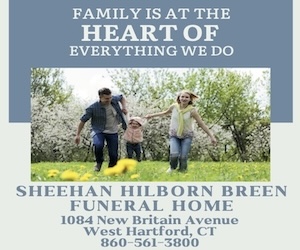
By Cindy Mindell
WEST HARTFORD – Children born to Holocaust survivors must walk a tricky line: honor and preserve their parents’ weighty legacy and learn to forge their own.
“I recently went to a program for children of survivors where someone said, ‘The most important event in my life happened decades before I was born,’” recalls Sharone Kornman, who lives in Farmington.
Last month, Kornman joined five fellow members of Voices of Hope at a workshop to learn how to tell her own story.
Voices of Hope was founded in 2008 by Alan Lazowski, a West Hartford resident and son of Holocaust survivor, Rabbi Philip Lazowski, as a way for second- and third-generation descendants to preserve and pass down the survivors’ legacy. Under the auspices of the Jewish Federation Association of Connecticut (JFACT) Fund, Voices of Hope created a statewide network of children and grandchildren of Holocaust survivors to collect, categorize, and share the experiences of Holocaust survivors for the benefit of future generations.
The storytelling workshop and showcase were led by Matthew and Elysha Dicks, Newington residents who launched Speak Up three years ago, inspired by the national “The Moth” live-storytelling organization. In addition to producing regular storytelling shows organized around specific themes, Speak Up partners with organizations throughout the state to teach and cultivate the art of storytelling.
Jane Coppa, daughter of Holocaust survivor Simon Konover z”l who grew up in West Hartford and now lives in Florida, read about Speak Up and offered a donation to JFACT to help Voices of Hope members learn to hone their storytelling skills.
“My dad would talk about his experiences during World War II in a very humble, very real and emotional way and I thought, ‘If that’s something I could learn to do, it would be terrific,’” says Coppa, who was unable to attend the workshop. “If there are other people out there who have the same feeling, it will be a worthwhile program.”
The workshop was a natural fit for Voices of Hope, which encourages survivors and descendants to tell their stories in classrooms and at community commemorations.
“My fear was that the workshop participants were going to want to tell their parents’ stories and I knew that that wasn’t going to be effective,” says Matthew Dicks, who led the five-session workshop. “Storytelling only works if the person telling the story is telling their own story; otherwise, it’s just a history lesson and you’re talking about someone who’s not present. But to their credit, once I explained that we could embed their survivors’ stories within their own stories, they were receptive.”
Dicks says that the workshop participants expressed relief that they didn’t have to cover the entire scope of their parents’ stories.
“Storytelling ultimately has to be compelling in some way,” he says. “You can tell your story and embed the survivor’s experience into it. There has to be some content where the audience understands what happened in a way that they didn’t understand before. But we surround that with something that’s much more entertaining and story-like, something you’re going to want to listen to.”
On July 31, Voices of Hope presented “Second Generation Speak Up,” a showcase of seven-minute stories, to an audience of family and friends in the auditorium of the Solomon Schechter Day School of Greater Hartford.
“I don’t think any of us realized what Speak Up would lead to,” says Jeff Israel, a Hartford native whose parents both survived the Holocaust. “We knew we were probably going to enhance our skills in telling our parents’ stories, but we’ve always been telling our parents’ stories and this group got us to tell our stories as we’ve experienced life with our parents.”
Israel talks about growing up “different” and not hearing or talking about the Holocaust or his survivor parents. He didn’t know a lot about their stories, only that his father had been in Auschwitz and his mother and her family had escaped Germany a few months after Kristallnacht.
“When I was in the Cub Scouts, I came home and told my mom, ‘I have an opportunity to march in a parade’ and she said, ‘You’ll have to ask your dad.’ My dad said, ‘I did enough marching for you. No,’” Israel says.
“I had no idea what that meant but I didn’t ask him. I was young and nobody was talking about it. It wasn’t until many years later that I learned that he was in the forced march out of the camp and he didn’t feel that I should go and be in a parade and march.”
The Israel family joined Congregation Tikvoh Chadoshoh in Hartford, founded by fellow German Jews, many Holocaust survivors among them. “Nobody talked about it, ever; they didn’t have the words ‘Shoah’ or ‘Holocaust’ until the ‘60s, when I was a teenager, and I didn’t know those words,” Israel says.
Instead, as Israel related in his Speak Up story, he couldn’t bring himself to ask his parents how and why they had survived.
“I was afraid that maybe they had done something that I’d be embarrassed about, because there were so few survivors from their towns,” he says. “You talk about millions of people dying and only a few coming out. How did they make it? I knew my parents and they were good people and it wasn’t something that I was sure of; it’s just that I didn’t know how to ask.”
Israel’s father finally started telling his story in his 70s. “It wasn’t until my 30s that I understood a lot of things that my dad said that I never asked him to explain,” Israel says. “And I’m not ashamed of my parents; they didn’t do anything that was awful.”
Now 64, Israel tells his family’s stories in schools, mostly in Bristol, where he currently lives. “In high school, I didn’t talk about it.”
Now the Second Generation is talking and I’m hoping that our audiences say, ‘I knew about the Holocaust but I didn’t really KNOW about it. That’s what Voices of Hope is fostering: we want people to understand because once all the survivors are gone, people are going to say, ‘It never happened.’”
Israel is sometimes accompanied by his mother in the classroom, and took the Speak Up workshop to learn to be a more effective speaker. “How do I portray my mother’s story just by myself?” he says. “Can I make the kids understand what my family went through? I think I can now.”
Clinical psychologist Lois Berkowitz signed up for the same reason.
“I’ve been struggling for a while with how to make my father’s story compelling and memorable for people,” says the West Hartford resident. “That’s the key, whether we’re speaking to students or people in the community: to be able to continue to carry the memory of the Shoah. If the idea is to make sure that people understand what happened so that they don’t just listen but take action to prevent something like this from happening in the future, how can I tell something compelling enough that people really want to do something active with the information they’re hearing?”
The process of preparing her Speak Up story became a nostalgic recollection of her father, who died in 2007.
“For the last five years of my father’s life, I was mostly in a caretaker role,” she says. “His wife had passed away, he had a lot of needs, and we moved him up to Connecticut. Being able to put his story together required that I listen to some of his recorded testimony that I hadn’t listened to in a long time. So I had a sense of happiness wash over me just hearing his voice again. And in so many ways, I was able to remember my dad in a different way and a better way and appreciate him even more than I had before, after remembering how much he fought to live and how much he lost in a much more personal way.”
In her story, Berkowitz begins by recounting a phone call from her father, who had fallen on his back at home. “My husband and I went to my father’s house and I said, ‘Let’s put some ice on your back,’” she recalls. “But there was no ice; there were just layers and layers of frozen food. I took a bag and my father was moaning in pain but he said, ‘Not the Swedish meatballs.’ My story went from there, on to my relationship with my father and the impact of his starvation and slavery on the choice of what he was going to ice his back with.”
That particular brand of dark humor is a familiar part of Berkowitz’s early life, growing up in Cherry Hill, N.J. with an Auschwitz survivor and among other children of survivors, and only to be shared with peers who would “get it.”
“In my father’s circle of friends, there was a hierarchy of who suffered more,” Berkowitz recalls. “In my childhood, when I first heard about Elie Wiesel, I would say to my father, ‘He was at Auschwitz too. Did you ever see him?’ and Dad would say, ‘He got there late, he doesn’t know from suffering.’ I didn’t laugh when he said it because my father was as serious as a heart attack, but for me and my husband – who is also the child of survivors – we had to laugh about it.”
Berkowitz sees a parallel with the way humor is applied in psychotherapy. “In my field, humor is often used as a way to break some tension and help add to the therapeutic relationship,” she says. “There’s literature that speaks to the use of humor when you’re dealing with post-traumatic stress disorder, as just one tool when you’re stuck or when you’ve hit a wall in dealing with your trauma, and you need a little break from it.”
Berkowitz says that the workshop proved an effective vehicle to learn how to relate her father’s story in a compelling way.
“When I was young, he used to talk about his experiences a lot and I don’t know how ready I was to hear it, and by the time I was ready to hear it, he wasn’t talking so much,” she says. “I always regretted that I wasn’t ready to hear what he was trying to share with me and then regretted that he wasn’t ready to share when I wanted to hear. So this was the best and the closest I could get – him sharing with me and me being ready to hear it. My father’s goal was always for me to be able to carry on his story, so I feel I’ve fulfilled that – or at least started to.”
Evelyn Fishman, who lives in West Hartford, joined Voices of Hope with the intention of eventually going into classrooms to talk about the Holocaust and share her parents’ experiences – once they are no longer able to. A native of Romania, Fishman was born in 1956 in the house that once belonged to her father’s older brother, who had died in the Holocaust along with his family.
“I experienced antisemitism in Romania as a young child,” she recalls. “Most of the Jews who survived the war emigrated, and we were some of the few Jews left. My mother, who had also lost family members, didn’t want to make any waves in the neighborhood, so she made a point of acting like we’re not Jewish. We did everything possible to fit in.”
When Fishman was six, the family finally got out, spending four years in Israel before immigrating to the U.S. in 1966. She grew up in Los Angeles, California.
While Fishman’s mother never talked about her wartime experiences, her father shared his story. Before the war, half of his family had immigrated to the U.S. but couldn’t get the rest of the family out. Fishman’s father was imprisoned in a work camp whose inmates were put on a train for Auschwitz toward the end of the war. Before boarding, he escaped with four fellow inmates, who were all hidden by a Polish family until liberation.
While Fishman originally planned to tell a story about her father, she chose instead to talk about herself.
“As a young child and until I became an adult, I didn’t want to be Jewish because I knew what happened to my parents and to their families,” she says. “My Jewish name is Chaya Sora, in honor of my dad’s two sisters who died in the Holocaust. So there wasn’t a day that went by when I didn’t know about the Holocaust. As a young child, I kept thinking, ‘Bad things happen to Jews; why do we have to be Jewish?’ Even though we lived in Israel for four years before we came to the United States, I still tried to distance myself from my Jewishness and it took me a long time to finally make peace with it.”
The workshop helped Fishman prepare for future classroom presentations.
“I want to be ready when the time comes and now I’m better able to craft a story,” she says. “The older I get, the more I realize how important it is to not let this history be forgotten.”
For Farmington resident Peter Fishman — no relation to Evelyn — the Holocaust seemed an unremarkable part of his family history. He knew that his mother and her family had survived the Holocaust, but only understood the extent of their suffering when he reached his 30s.
“I grew up sheltered from the facts and the hate that the facts could have created,” he says. “My mother and grandmother, in the stories they told me as a child, made it sound like their time in Theresienstadt was like a bad summer camp. It was more likely that they would tell me a story about kids starving in Biafra to get me to clean my plate, than stories about the war. In the process of writing my story, I remembered Biafra – I had no idea what it was. I never studied it growing up. It was never a topic in high school. I Googled it and learned that it was a genocide in what was part of Nigeria, where three million people were killed. So here it is: my mother and grandmother are using the example of another genocide when I’m a child, as it relates to being lucky to have food on the table.”
When Fishman was 35, he went to Israel on a UJA mission. On a visit to Yad Vashem, he says, “for the first time in my life, I realized what really happened to my family: 132,000 Jews went to Theresienstadt, 32,000 died, 88,000 were sent to Auschwitz, fewer than 20,000 survived.
“My mother and her brother are two of 2,000 kids who survived, out of 15,000.”
Fishman’s mother and uncle, maternal grandparents, and one pair of great-grandparents survived Theresienstadt, where his grandfather was conscripted by the Nazis to run a scrap-metal business.
“That particular trip to Yad Vashem opened my eyes to the reality of what my mother’s and her parents’ and grandparents’ survival really meant,” Fishman says. “That was the key point of my story: I’ve always known I was lucky and I really didn’t know why.
“After going to Yad Vashem and understanding what the facts were, I realized not only how lucky I was, but my responsibility to tell other people how important my lineage really is.”
Born to two Holocaust survivors in a Displaced Persons Camp in Frankfurt-am-Main, Germany, Susan Lederman joined Voices of Hope to make a difference. When the Speak Up program was announced, Lederman recalled what it was like to be bullied as a child new to America and to the English language, and called a “greenhorn” by an irate Jewish neighbor.
“So for my story, I started out with, ‘I wonder what I would have been like if we had stayed in Germany,’” she says. Lederman, who lives in West Hartford, recounted her parents’ experiences in concentration camps and the death of her younger sister, born after the family immigrated to the U.S. Lederman’s mother lost all of her family except for one brother, who ended up in New Haven. Her father lost all of his family except for some cousins, who were resettled in Chicago. And through it all, her parents somehow managed to cultivate a positive attitude.
“My mother did the Shoah Project with Spielberg and over the years, I’d hear about her experiences in the camps or hiding on a Polish farm. It was really difficult for them to sit down and talk about it, or they only talked about it amongst their friends. My mother would say things like, ‘My grandmother used to be a good cook.’ My father was so optimistic. When I went through some hard times, he would say, ‘Don’t worry, the sun will shine on you.’ Their outlook was unbelievable.”
As long as Holocaust survivors can still tell their stories, many descendants are reluctant to take up the mantle until there is no one left to do so.
“My mother is still alive and well, living in West Hartford, and she has told her story – to my son’s U.S. History class at Hall High School, at the West Hartford Holocaust commemoration event two years ago – but I personally have never gotten up and spoken,” says Sharone Kornman.
Kornman told about a family visit, three years ago, to her mother’s hometown in Ukraine. Guided by her mother, they walk through the building, knocking on doors and asking to look around, with varying success.
“I talked about what we saw and what we didn’t see and how disappointing that was,” Feldman says. “Then I told how we went to the apartment where my mother was hidden by her nanny for over two years during the war, and who we went with and how we did not get into the apartment and why. It was my story, but I wove in my mother’s story: where she lived, how she lived before the war, and then how she was rescued from the ghetto and how she was saved.”
The workshop process proved to Kornman that everyone has a story to tell, no matter how big a shadow their parents’ stories may throw.
“When I walked into the Speak Up workshop, I felt that the main story in my life happened even before I was born, so I’m not even part of the story,” she says. “But what we all learned is that we have a different story to tell. The history books will tell the story about what happened to the people in the Holocaust. As a survivor, my mother can tell you, very succinctly and beautifully, what happened to her. If she can’t be there to tell it, I can tell it in a second-hand way, but I can’t do it justice and I don’t need to do it justice. I need to tell my story and that will resonate with people because it’s authentic.”
But Berkowitz was worried about the reaction of a certain segment of the audience that she hadn’t considered while preparing her talk.
“The one thing that I didn’t plan or prepare for when I was getting ready to do the showcase was how it was going to be received by survivors,” she said. “When I came to the showcase and there were a few survivors in the audience, I started to get a little anxious. Historically for me, it’s always been about making sure that survivors are comfortable and so I was very nervous about whether this was going to be well-received by the survivors in the audience. I am the chairperson for the annual community-wide Holocaust commemoration and one of the things that we are constantly trying to balance is that, at the end of the day, even if there’s one survivor left in the entire community, it always has to be about them – not to the exclusion of other things; we talk about the need to pass the baton to the next generation – but when it comes to anything related to memorials, it’s always about the survivors and their desires are always first and foremost for me.
“That was my thinking and all of a sudden, when I was looking at the audience and seeing survivors, I was thinking, “What if they don’t like this?”
But they did.
“I’m happy to say that the majority of the survivors I spoke to seemed to be very happy with it,” she reported.
Voices of Hope plans a second Speak Up storytelling workshop and showcase for descendants of Holocaust survivors.
For information: ctvoicesofhope.org / (860) 727-5770.
CAP: At the Speak Up: (l to r): Matthew Dicks, Alan Berkowitz (husband of Lois Berkowitz and a member of Voices of Hope), Peter Fishman, Sharone Kornman, Jeff Israel, Elysha Dicks, Lois Berkowitz, Susan Lederman, Evelyn Fishman, Alan Lazowski, and JFACT Executive Director Bob Fishman.








 Southern New England Jewish Ledger
Southern New England Jewish Ledger












